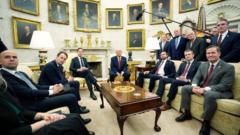An apparent security breach in a military chat involving key Trump administration figures has unveiled internal disagreements over potential military action in Yemen, highlighting tensions surrounding US-Europe relations and defense responsibilities.
Leaked Military Chat Reveals Tensions Around US Actions in Yemen

Leaked Military Chat Reveals Tensions Around US Actions in Yemen
A recent leak exposes serious concerns among Trump administration officials regarding military strikes against the Iranian-backed Houthi group in Yemen.
In an unexpected turn of events, a significant security breach has sent ripples through Washington, as leaked communications from a military chat group bring to light the internal dynamics of the Trump administration regarding military operations in Yemen. The leak, which originated from the Atlantic magazine's Jeffrey Goldberg, reveals discussions among high-ranking officials including Vice President JD Vance and Defense Secretary Pete Hegseth about military strikes against the Iranian-backed Houthi group.
Goldberg reported that a classified military plan was discussed, detailing weapon packages, targets, and timings of the strikes, mere hours before the bombings occurred. The Vice President raised crucial concerns, indicating that the military action might serve European interests more than American ones, specifically regarding trade routes through the Suez Canal.
Vance expressed his alignment with continuing the operation but suggested a one-month delay while voicing his concerns to Defense Secretary Hegseth about the U.S. 'bailing out' Europe yet again. This sentiment was echoed by Hegseth, who lamented what he referred to as “European free-loading,” while a group member stressed the need for tangible benefits for the U.S. following its military interventions.
Following the strikes, expressions of approval and prayer emojis were shared among chat members, revealing a level of complicity and camaraderie despite the weight of the decisions being made. The dialogue also included strategic messaging aimed at framing actions against the Houthis in a manner that shifted blame onto the Biden administration for being perceived as too lenient towards Iran.
The incident has led to increased scrutiny on National Security Adviser Mike Waltz, with calls from Democrats for an urgent investigation into the breach. Despite the revelations, Trump has claimed ignorance of the details and has supported Waltz, while Hegseth insists that no confidential military plans were discussed within the group. As the fallout continues, the implications for U.S. foreign policy and military strategy in the region remain a focal point of concern.























